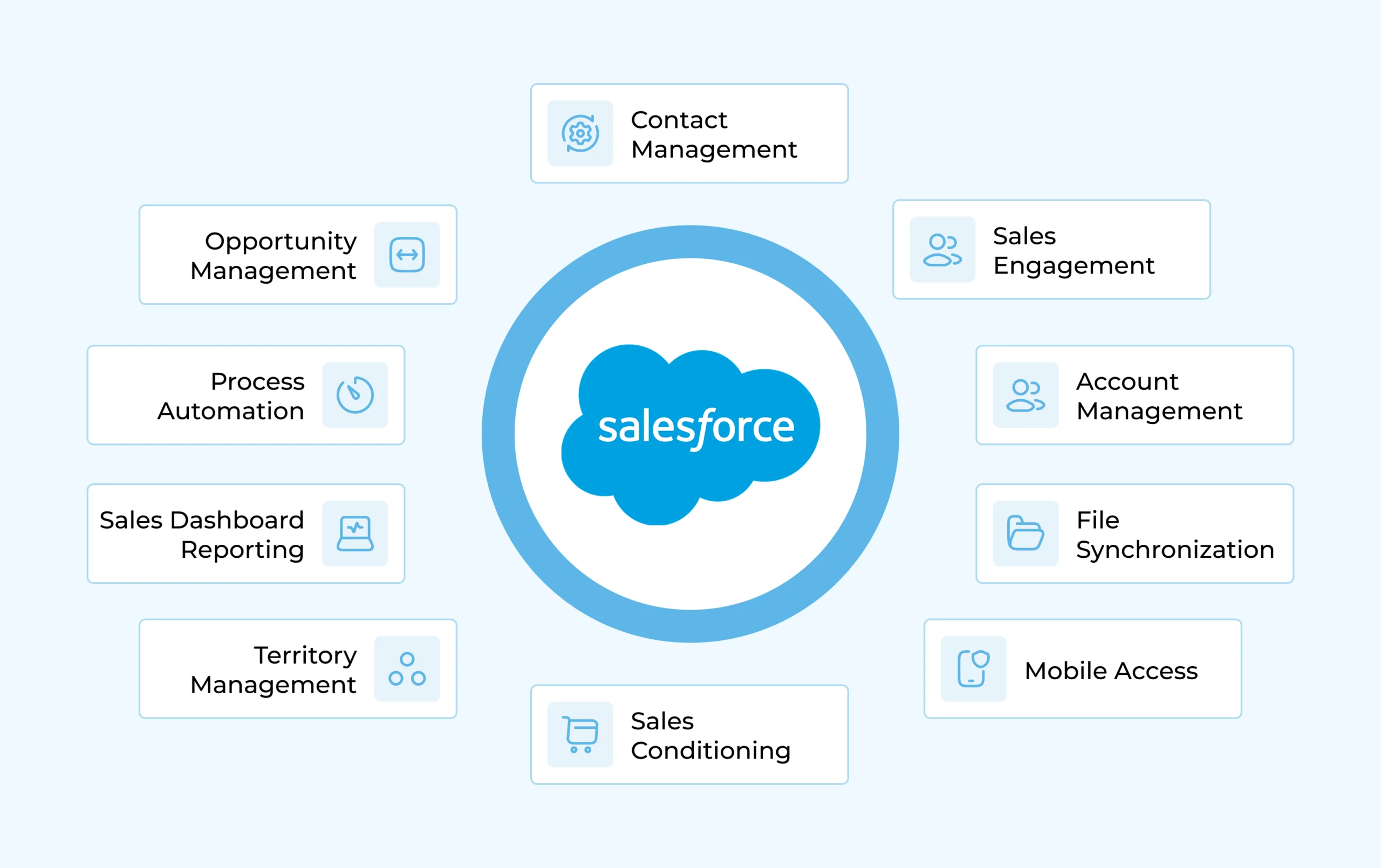Salesforce: Your Complete Guide to the World’s #1 CRM

Salesforce: A Guide for Young Professionals
In today’s fast-paced digital world, businesses are increasingly relying on technology to connect with customers. One such powerful tool is Salesforce, a leading Customer Relationship Management (CRM) platform that helps organizations manage and grow their relationships with clients. This guide will provide an overview of Salesforce, its key features, and how it can benefit young professionals entering the workforce.
What is CRM?
Before delving into Salesforce, it’s crucial to understand the concept of Customer Relationship Management (CRM). CRM refers to the strategies, processes, and technologies employed by businesses to effectively manage their interactions with both existing and potential customers.
Imagine a scenario where a company meticulously tracks every interaction with a customer: from the initial inquiry to the final purchase and subsequent support. This involves gathering and organizing information like contact details, purchase history, communication preferences, and feedback. This organized data empowers businesses to:
-
- Identify and prioritize leads: Target the most promising potential customers for sales and marketing efforts.
- Personalize customer interactions: Tailor messages and offers to individual customer needs and preferences. For example, a company might offer a special discount to a loyal customer celebrating their birthday.
- Improve customer service: Respond to inquiries promptly and effectively, resolve issues swiftly, and provide exceptional support.
- Gain valuable insights: Analyze customer data to identify trends, understand customer behavior, and make informed business decisions.
Examples of CRM in Everyday Life
We encounter CRM in our daily lives more often than we realize.
-
- Loyalty programs: Stores like Starbucks and Sephora employ CRM to track customer purchases and reward loyalty with points and exclusive offers.
- E-commerce platforms: Online retailers such as Amazon leverage CRM to personalize product recommendations, track shipping information, and handle customer inquiries efficiently.
- Social media platforms: Social media giants like Facebook and Instagram utilize CRM to analyze user behavior, target advertisements, and provide personalized recommendations based on individual interests.
Key Salesforce Features
Salesforce offers a suite of cloud-based applications designed to cater to various business needs. Let’s explore some of its key features:
-
Sales Cloud:
This is the core of Salesforce, focusing on managing the sales process. It helps sales teams:
- Track leads and opportunities: Monitor potential customers from initial contact to conversion.
- Manage sales activities and forecast: Track sales calls, meetings, and emails. Forecast future sales revenue to plan and budget effectively.
- Build customer relationships: Understand customer needs and preferences to build strong, long-term relationships.
- Automate sales tasks: Streamline repetitive tasks like data entry, lead assignment, and email campaigns to increase efficiency.
-
Service Cloud:
This module is designed to enhance customer service. It enables businesses to:
- Provide efficient customer support: Handle customer inquiries through various channels like phone, email, chat, and social media.
- Manage customer cases and inquiries: Track customer issues, prioritize them based on severity, and ensure timely resolution.
- Offer live chat and other communication channels: Provide real-time support and engage with customers in a more interactive manner.
- Create a knowledge base: Empower customers to find answers to their questions independently through a self-service portal.
-
Marketing Cloud:
This module empowers businesses to effectively engage with their target audience through:
- Email marketing campaigns: Create, send, and track targeted email campaigns to reach the right audience with the right message.
- Social media marketing: Manage social media presence, track campaigns, and engage with customers on social media platforms.
- Marketing automation workflows: Automate tasks like lead scoring, email nurturing, and campaign segmentation.
- Campaign tracking and analysis: Track the performance of marketing campaigns and measure their return on investment (ROI).
-
AppExchange:
This is a marketplace where businesses can discover and integrate pre-built applications to extend the functionality of Salesforce. These apps can enhance features like project management, e-commerce integration, and more. -
Analytics and Reporting:
Salesforce provides robust analytics and reporting tools that enable businesses to:
- Gain valuable insights into customer behavior: Analyze customer data to understand their needs, preferences, and buying patterns.
- Track key performance indicators (KPIs): Monitor crucial metrics such as sales revenue, customer satisfaction, and marketing campaign performance.
- Make data-driven decisions: Utilize data-driven insights to optimize business processes, improve marketing campaigns, and make informed decisions.
How Salesforce Works

Salesforce operates as a cloud-based platform, meaning all data is stored and accessed remotely over the internet. This eliminates the need for businesses to invest in and maintain expensive hardware and software infrastructure.
Key aspects of how Salesforce works include:
-
- Data entry and management: Users can easily input and manage customer data, sales opportunities, and other relevant information within the Salesforce platform.
- Workflow automation: Salesforce empowers businesses to automate repetitive tasks such as lead assignments, email sequences, and approval processes, significantly improving efficiency.
- Reporting and analytics: Salesforce provides built-in reporting and analytics tools that allow users to track key metrics, generate reports, and gain valuable insights into customer behavior.
- User interface and navigation: Salesforce offers a user-friendly interface with intuitive navigation, making it easy for users to find and access the information they need.
Benefits of Using Salesforce
Salesforce offers a wide range of benefits for businesses of all sizes:
-
- Increased sales productivity: By automating repetitive tasks and streamlining sales processes, Salesforce empowers sales teams to be more efficient and productive.
- Improved customer satisfaction: By providing timely and personalized customer support, Salesforce helps businesses build stronger customer relationships and improve overall customer satisfaction.
- Better data management and insights: Salesforce provides a central repository for all customer data, making it easy to manage, analyze, and gain valuable insights. This data-driven approach enables businesses to make informed decisions and optimize their strategies.
- Streamlined business processes: Salesforce helps to streamline and automate business processes, improving efficiency and reducing errors.
- Enhanced collaboration and teamwork: Salesforce facilitates collaboration and teamwork by providing a shared platform for all teams to access and share information.
- Scalability and flexibility: Salesforce is a scalable platform that can grow with your business as your needs evolve.
Use Cases of Salesforce
Salesforce is a versatile platform with applications across various industries and departments. Some common use cases include:
-
- Sales teams: Managing leads, tracking sales opportunities, forecasting sales revenue, and automating sales processes.
- Marketing teams: Planning and executing marketing campaigns, tracking campaign performance, and analyzing customer behavior.
- Customer service teams: Handling customer inquiries, resolving issues, and providing support.
- Non-profit organizations: Managing donor relationships, tracking donations, and organizing fundraising campaigns.
- Small businesses and enterprises: Salesforce can be adapted to meet the specific needs of businesses of all sizes, from startups to large corporations.
Getting Started with Salesforce
-
- Free trial and demo: Salesforce offers a free trial and demo to allow potential users to explore the platform and experience its features firsthand.
- Salesforce implementation partners: Salesforce has a vast network of certified partners who can help businesses implement, customize, and integrate Salesforce.
- Training and certifications: Salesforce offers a wide range of training courses and certifications to help users learn how to use the platform effectively.
Conclusion
Salesforce is a powerful and versatile CRM platform that is transforming the way businesses connect with their customers in the digital age. By leveraging the capabilities of Salesforce, businesses can:
-
- Increase sales and revenue
- Improve customer satisfaction
- Gain a competitive advantage
- Drive business growth
For young professionals entering the workforce, understanding Salesforce can be a valuable asset. As businesses increasingly adopt CRM solutions, professionals with Salesforce knowledge will be highly sought after.
Contact us to learn more about our Salesforce consulting services and how we can help you succeed in the digital age.
